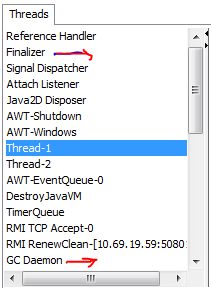Daemon Thread
Daemon thread is a thread that provides services to the user thread. There are many java daemon threads running automatically e.g. gc, finalizer etc. JVM terminates these thread automatically.
We can see all daemon threads using JConsole (C:\ProgramFiles\Java\jdk1.8.0_45\bin\jconsole.exe)

-
It provides services to user threads for background supporting tasks. It has no role in life than to serve user threads.
-
Its life depends on user threads.
-
It is a low priority thread.
We have two methods to dealing the Demon Threads
1.public void setDaemon(boolean status) : set scurrent thread as daemon thread or user thread.
2. public boolean isDaemon() : is used to check that current is daemon.
Example
public class DemonEx extends Thread {
@Override
public void run() {
Thread th = Thread.currentThread();
if (th.isDaemon()) {
System.out.println("DEMON THREAD " + th.getName());
} else {
System.out.println("NORMAL THREAD " + th.getName());
}
}
public static void main(String[] args) {
DemonEx t1 = new DemonEx();
DemonEx t2 = new DemonEx();
t1.setDaemon(true);
t1.start();
t2.start();
}
}
---------------------------
DEMON THREAD Thread-0
NORMAL THREAD Thread-1
If you want to make a user thread as Daemon, it must not be started otherwise it will throw IllegalThreadStateException
public static void main(String[] args) {
DemonEx t1 = new DemonEx();
DemonEx t2 = new DemonEx();
t1.start();
t1.setDaemon(true);
t2.start();
}
-------------------------------------
Exception in thread "main" java.lang.IllegalThreadStateException
at java.lang.Thread.setDaemon(Thread.java:1352)
at threads.DemonEx.main(DemonEx.java:18)
Thread Group
Thread Group is a process of grouping multiple threads in to a single object. We can suspend, interrupt & resume in a single method call.
Constructors
ThreadGroup(String name): creates a thread group with given name.ThreadGroup(ThreadGroup parent, String name):creates a thread group with given parent group & name.
Methods
int activeCount()returns no. of threads running in current group.int activeGroupCount()returns a no. of active group in this thread group.void destroy()destroys this thread group and all its sub groups.String getName()returns the name of this group.ThreadGroup getParent()returns the parent of this group.void interrupt()interrupts all threads of this group.void list()prints information of this group to standard console.
class ThreadEx extends Thread {
@Override
public void run() {
Thread th = Thread.currentThread();
System.out.println("Thread Name:"+th.getName()+"Name:"+ th.getThreadGroup());
}
}
public class ThreadGroupDemo {
public static void main(String[] args) throws InterruptedException {
ThreadGroup tg = new ThreadGroup("SmlCodes Group");
ThreadEx thread = new ThreadEx();
// adding thraeds to Theard Group
Thread t1 = new Thread(tg, thread, "Thread-1");
t1.start();
Thread t2 = new Thread(tg, thread, "Thread-2");
t2.start();
Thread t3 = new Thread(tg, thread, "Thread-3");
t3.start();
tg.list();
}
}
---------Output---------------
java.lang.ThreadGroup[name=SmlCodes Group,maxpri=10]
Thread Name: Thread-3 Thread Group Name: java.lang.ThreadGroup[name=SmlCodes Group,maxpri=10]
Thread Name: Thread-1 Thread Group Name: java.lang.ThreadGroup[name=SmlCodes Group,maxpri=10]
Thread Name: Thread-2 Thread Group Name: java.lang.ThreadGroup[name=SmlCodes Group,maxpri=10]
Thread[Thread-1,5,SmlCodes Group]
Thread[Thread-2,5,SmlCodes Group]
Thread[Thread-3,5,SmlCodes Group]